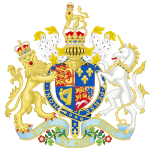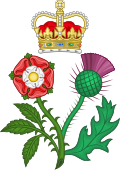
The Parliament of the United Kingdom of Great Britain and Northern Ireland is the supreme legislative body of the United Kingdom, and may also legislate for the Crown Dependencies and the British Overseas Territories. It meets at the Palace of Westminster in London. Parliament possesses legislative supremacy and thereby holds ultimate power over all other political bodies in the United Kingdom and the Overseas Territories. While Parliament is bicameral, it has three parts: the sovereign, the House of Lords, and the House of Commons. The three parts acting together to legislate may be described as the King-in-Parliament. The Crown normally acts on the advice of the prime minister, and the powers of the House of Lords are limited to only delaying legislation.

The first Parliament of the Kingdom of Great Britain was established in 1707 after the merger of the Kingdom of England and the Kingdom of Scotland. It was in fact the 4th and last session of the 2nd Parliament of Queen Anne suitably renamed: no fresh elections were held in England or in Wales, and the existing members of the House of Commons of England sat as members of the new House of Commons of Great Britain. In Scotland, prior to the union coming into effect, the Scottish Parliament appointed sixteen peers and 45 Members of Parliaments to join their English counterparts at Westminster.
This is a list of the parliaments of the United Kingdom, of Great Britain and of England from 1660 to the present day, with the duration of each parliament. The NP number is the number counting forward from the creation of the United Kingdom in 1801 and Great Britain in 1707. Prior to that, the parliaments are counted from the Restoration in 1660.
Northumberland, was a County constituency of the House of Commons of the Parliament of England from 1290 to 1707, then of the Parliament of Great Britain from 1707 to 1800 and of the Parliament of the United Kingdom from 1801 to 1832. It was represented by two Members of Parliament.
Ludgershall was a parliamentary borough in Wiltshire, England, which elected two Members of Parliament (MPs) to the House of Commons from 1295 until 1832, when the borough was abolished by the Great Reform Act.
Heytesbury was a parliamentary borough in Wiltshire which elected two Members of Parliament. From 1449 until 1707 it was represented in the House of Commons of England, and then in the British House of Commons until 1832, when the borough was abolished by the Reform Act 1832.

Phillips Gybbon, of Hole Park, Rolvenden, in Kent, was an English Whig politician who sat in the House of Commons between 1707 and 1762.
Samuel Kent was an MP for Ipswich in the 8th, 9th, and 10th Parliament of Great Britain, sitting from 23 January 1735 to his death in 1759.
This page is based on this
Wikipedia article Text is available under the
CC BY-SA 4.0 license; additional terms may apply.
Images, videos and audio are available under their respective licenses.





